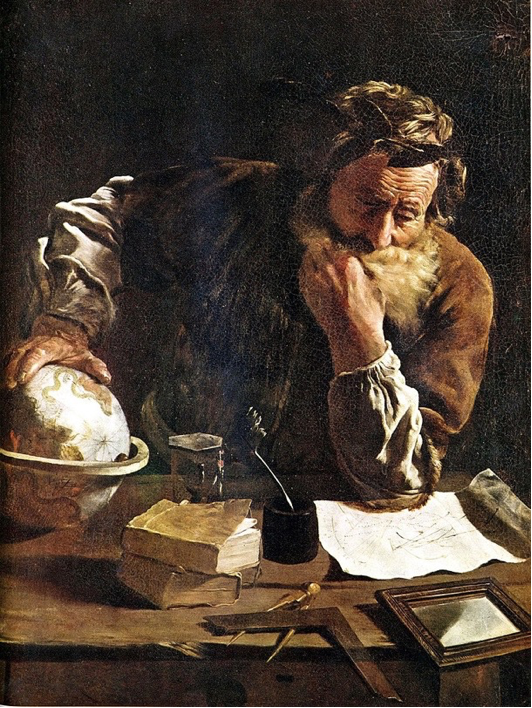The Eureka Revelation of Archimedes: A Historical Insight
Written on
The Life and Legacy of Archimedes
The image of a man sprinting through the streets in the nude, exclaiming "Eureka!" is not something one would typically witness in ancient Syracuse. This man, according to legend, was Archimedes, hailed as the foremost scientist of his time and arguably one of the greatest in history. He had just unraveled a complex problem that had preoccupied him: determining the purity of gold in a royal crown commissioned by King Hiero. The king suspected that the goldsmith had mixed in base metals and tasked Archimedes with confirming the crown's authenticity.
The term "Eureka," translating to "I have found it" in Greek, encapsulates Archimedes' moment of inspiration while bathing. He observed that water overflowed from the tub as he entered, leading to his formulation of the principle of buoyancy. Upon applying this principle, he discovered that the crown contained impurities by assessing its density through the volume of water it displaced.
Born around 287 BC in Syracuse, Sicily—a thriving Greek city-state—Archimedes was the son of Phidias, an astronomer. His diverse talents made him a polymath; he excelled as a mathematician, physicist, astronomer, engineer, inventor, and designer of war machines. Philosopher Alfred North Whitehead famously noted that Archimedes embodied "a great civilization all by himself."
Archimedes made groundbreaking contributions to mathematics, developing formulas to calculate the surface area and volume of a sphere. He established that the fraction 22/7 serves as an approximation for pi (π), a convention that persisted from antiquity through the Middle Ages until the advent of electronic calculators. The foundational work of later scientists, such as Kepler, Galileo, and Descartes, heavily relied on Archimedean principles.
Recognized by many as the father of mathematics, Archimedes emphasized the importance of pure mathematics. He demonstrated how exponents could express larger numbers and showed that multiplication of exponential numbers could be simplified by adding their exponents. His innovative integration methods allowed him to determine areas, volumes, and surface areas of various shapes, laying the groundwork for infinitesimal calculus.
Some of Archimedes’ insights are preserved through correspondence with his friend Eratosthenes, the chief librarian of the renowned Library of Alexandria. He pioneered the fields of mechanics and hydrostatics, revealing the laws of levers and pulleys, which enable the movement of heavy objects with minimal force, and introduced the concept of the center of gravity.
A notable invention of Archimedes was a highly precise catapult that successfully defended Syracuse for years, likely based on his understanding of the mathematics behind projectile motion. He is also rumored to have designed a system of mirrors that concentrated sunlight onto enemy ships, igniting them. This claim has faced skepticism from scholars, including Rene Descartes. However, experiments conducted in Athens in 1973 and at MIT in 2005 validated the feasibility of his burning method.

The Significance of the "Eureka Moment"
The term "Eureka Moment" is now widely used to describe instances of sudden inspiration or discovery, often appearing in scientific and philosophical discussions. Scholars who delve into the philosophy of science frequently differentiate between discovery and justification, a distinction known as the DJ distinction. The Eureka Moment of Archimedes represents an unforeseen burst of scientific ingenuity. The notion that a liquid generates an upward force counteracting gravity was both surprising and fascinating. It is likely that Archimedes conducted further experiments to validate his hypothesis, yet the sequence of discovery and justification remains ambiguous. Which comes first? Modern philosophers argue that discovery precedes justification; however, Archimedes’ exclamation of "Eureka!" suggests that both may occur simultaneously.
This dynamic is not universally applicable to scientific discoveries. Often, the acceptance of an idea or theory involves a laborious process of testing, verification, and refutation, making it challenging to draw a clear line between discovery and justification.
While the theoretical distinction between discovery and justification may be intriguing, its practical implications in the study of the scientific method are questionable. Is the Eureka Moment a facet of discovery or justification? Some philosophers dismiss the DJ distinction as muddled, while others prioritize it in their studies. The Eureka Moment itself has become a subject of investigation. One might argue that Archimedes' excitement stemmed from the belief that his "Eureka" was backed by some form of justification. In essence, his discovery explained a phenomenon, and at the moment of realization, he felt confident in its validity.
Recent research into scientific practices suggests that separating discovery from justification may be futile. Regardless of the philosophical significance of the DJ distinction, we can still admire and celebrate the Eureka Moment and the life of Archimedes, one of antiquity's greatest scientists.
In this enlightening video titled "The real story behind Archimedes' Eureka!" by Armand D'Angour, viewers can delve into the fascinating narrative of Archimedes' pivotal moment and its implications in the realm of science.
The second video, "How taking a bath led to Archimedes' principle" by Mark Salata, provides an engaging exploration of how a simple bath became the backdrop for one of science's most famous discoveries.